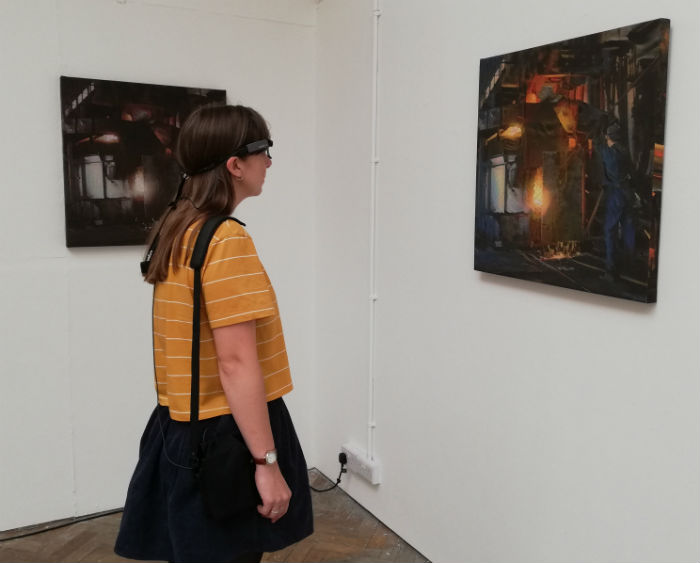Overview of 'Vision for the Future' funded projects
Dr Rosie Clark, Dr Jasmina Stevanov, Dr Brian Sullivan, Dr Aaron Zhang, Dr Paul Hill
Psychology Common Room, Social Sciences Complex, 12a Priory Road
Today's seminar will be co-presented by the recipients of the final tranche of the EPSRC funded Platform Grant - Vision for the Future. The primary focus of the grant is on developing a better understanding of the visual mechanisms and processes evolved in humans and other animals, and relating these to analogous technology challenges.
The researchers successfully bid for funding, within the scope of the following three themes:
- Visual immersion
- Finding and hiding things
- Vision in motion
1. Recording children’s eye movements in the clinic - Dr Rosie Clark, Research Associate, Centre for Academic Child Health, Bristol Medical School Population Health Sciences
In this talk Rosie will present her recent project funded by the BVI ‘Vision for the Future’ grant involving the piloting of a clinical service for eye tracking children at Bristol Eye Hospital. Eye tracking is rarely used in NHS clinics despite the potential for it to highlight abnormalities that may not be seen by eye. The use of eye tracking in clinics could therefore aid the diagnostic pathway and monitor disease progression. She will discuss the development of a suite of flexible, engaging and child-friendly eye movement tests, and the application of these in a clinical setting with children across a range of abilities and ages. She will also talk about the issues encountered, the positives of the pilot study and the next steps for this project.
Biography
Rosie has been working as a post-doctoral researcher in Bristol (with Iain Gilchrist and Cathy Williams) for the past three years, primarily researching abnormalities in paediatric eye movements. One stream of this work has involved the development of a novel app for training eye movement control, and the other stream is focussed on how eye tracking can be utilised in NHS ophthalmological clinics; for example, to aid diagnostics and monitor disease progression. She has also recently spent some time working in epidemiological research alongside Jean Golding, on genetic and vision-related data in ALSPAC.
2. Painting and Curating with AI - Dr Jasmina Stevanov, Senior Research Associate, School of Psychological Science
This research tackles a centuries-old conundrum: what makes paintings aesthetically pleasing - their style or their semantic content? Using convolutional neural networks (CNNs) they transformed photos into paintings featuring artistic styles of several artists and exhibited them at The Island gallery Bristol in September 2019. More than 50 visitors took part in an eye-tracking experiment during the exhibition, enabling us to extract the strength of their preference for certain styles and contents and make predictions about their future choices.
Biography
Jasmina was trained as an experimental psychologist and artist at the University of Belgrade and during her doctoral (Ritsumeikan University, 2009-2013) and postdoctoral (Kyoto University, 2013-2015) work in Japan she focused on incorporating these two disciplines through the psychophysics of illusions and neuroscience of aesthetics. Her current research focuses on using machine learning and eye-tracking techniques to explore individual preferences for visual art.
3. Improving Eye Movement Evaluation & Outcome Measures in Hemianopia - Dr Brian Sullivan, Senior Research Associate, School of Experimental Science
Stroke can result in significant loss of vision in one visual field (hemianopia). Hemianopia alters behaviour and patients may or may not successfully adapt. We seek to develop an eye movement evaluation using naturalistic videos to assess adaptation and guide eye movement rehabilitation.
Biography
Dr Brian Sullivan is a Senior Research Associate in the School of Experimental Science working with Iain Gilchrist and Casimir Ludwig. His research uses eye tracking technology to study visual attention and visuomotor coordination. He works on the Glance Project at Bristol studying real-world problem solving and how eye tracking and video data might be used to detect errors or need for assistance.
4. ViSTRA: video compression based on resolution adaptation - Dr Fan (Aaron) Zhang, Senior Research Associate, Visual Information Laboratory
Recent advances in immersive video formats have significantly challenged video compression and communication technologies. Aaron will present a new video coding framework which dramatically improves compression efficiency through perceptual resolution adaptation and deep learning based resolution up-sampling.
Biography
Aaron received his BEng (Hons) and MEng degrees from Shanghai Jiao Tong University, Shanghai, China, in 2005 and 2008 respectively, and his Ph.D degree from University of Bristol in 2012. He is currently working in the Visual Information Laboratory, led by Prof. David Bull, within the Department of Electrical and Electronic Engineering, University of Bristol, as a Senior Research Associate, with projects on perceptual video coding, quality assessment and MultiDrone cinematography.
5. Perceptual denoising - Dr Paul Hill, Research Fellow in Image Communication, Visual Information Laboratory
There have been many recent advances in image and video denoising over the last decade based on deep networks. Paul's recent work with BVI has focussed on optimizing image denoising for the best perceptual results. His work has resulted in a BVI based team placing fourth in the Huawei denoising challenge (out of over 100 participants) last year. These and other results will be presented and discussed.
Biography
Dr Paul Hillis a lecturer and research fellow within the department of electrical and electronic engineering specializing in; machine learning, audio, image, and video processing; and applications such as remote sensing image analysis and classification.
Contact information
For any queries, please contact bvi-enquiries@bristol.ac.uk.
Recording children’s eye movements in the clinic

Painting and Curating with AI